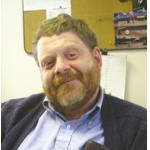May 2006 - The Thing
Insights, Gripes, and Conjecture
Latest News
April 1, 2006
By Anthony J. Lockwood
Some 75-85 years ago my grandfather worked for Alexander Smith & Sons Carpet mills on Nepperhan Avenue in Yonkers, NY. Established in 1865, Alexander Smith’s grew to a sprawl of plants covering a few city blocks. In 1954 the wool was pulled out from under the do-bees when the company was sold and moved for cheap labor in Mississippi. Today, those plants that remain harbor a variety of incubator businesses, which is economist lingo for money-strapped outfits that develop things the rest of us have not heard of yet. I think Poppy would like that idea. It’s work he loved to do.
Jack Toburn was one of those guys we once revered in the US and need to once again. Like most men of his day—he was born during Grover Cleveland’s first term—he barely attended grade school before going to work. Yet, Poppy could fix any machine, even when he wasn’t sure what the machine did. No training required.
|
|
| Lockwood |
But that wasn’t his talent. Poppy’s true talent was that he could take a vague notion—often just a “I wonder if we could build a machine for ...” goal—and make concept reality. That’s what he did at the carpet factory.
One forgotten day, probably in the early 1930s, Poppy’s boss summoned him into the owner’s office. Three Army guys “with a load of brass on their hats and shoulders” stood hunched over a bunch of sketches spread out on a conference table.
One of them asked Poppy if he could build something out of the sketches. It had to fit on a truck, he couldn’t talk about the thing or the job, and he couldn’t ask what it was that he was building. He said, “OK.”
So, according to family lore, Poppy spent the next few months alone tinkering with The Thing. He’d wander out to the machine shop to cut pipe, grab some bolts, return a tool. He marched straight to the owner for materials that were not on hand, such as wiring and metal mesh. And every so often the Army guys would show up with new sketches for another part of The Thing.
It was steady work at an elevated rate of pay during hard times, so the ECO delays were OK by Poppy. When he was done, the Army guys came one night with a truck and carted “the darnedest-looking contraption” away.
World War II. At some point, people learned about the military’s use of radar. Seeing a newspaper picture of a radar site, Poppy realized that the Army had asked him to build an early prototype of a mobile radar station.
Jack Toburn did not invent radar or even come up with its final design. For years he didn’t know what The Thing was. But, in those scary days and until his end, he was proud to know that he had helped the war effort.
On paper, Jack Toburn was just a clever guy, not an engineer. But he had an engineer’s heart, especially when his boss set him loose on an idea.
Poppy couldn’t get that job today. Not qualified. No degrees. He was too uneducated to know that he was not smart enough to help change the world. His boss, though, knew better.
Bosses, you know there’s a Jack Toburn in every engineer, and they are better educated than he. Set your engineers free on a vague notion. I bet they’ll incubate your firm’s next product success. You can name it The Thing.
Thanks, Pal —Lockwood
Lockwood is Anthony J. Lockwood is the Editorial Director, janitor, and resident crank at DE Magazine. Should you be so moved, you can send this joker an e-mail by clicking here. Please reference “Diatribes, May 2006” in your message.
Subscribe to our FREE magazine, FREE email newsletters or both!
Latest News
About the Author
Anthony J. Lockwood is Digital Engineering’s founding editor. He is now retired. Contact him via [email protected].
Follow DE






